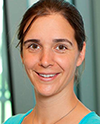Professor of Chemical Biology and new Director at the Leibniz-Institut für Molekulare Pharmakologie (Berlin), Dorothea Fiedler reveals a bright personality and how she found her way through the challenges of her recent career!
Why are you active in the field of chemical biology?
My education is in inorganic chemistry, but I have always had a fascination with the molecular basis of biological systems. It is still incredible to me how signaling and metabolic networks operate in a cellular setting with such high precision. As chemical biologists we have the opportunity to now create tools – complementary to traditional molecular biology methods – to interrogate these complex questions with great molecular detail.
Describe the most intense moment of your career.
Moving my lab across the Atlantic Ocean from Princeton to Berlin. I was very fortunate to have strong support from my graduate students, but the many weeks during which all our lab equipment (and all our household goods) were in a container somewhere on the ocean were very unsettling.
Which is the best idea you ever had?
To have children.
Do you have a role-model or a driving- force?
I really enjoyed working with my PhD advisors Ken Raymond and Bob Bergman, and my postdoc advisor Kevan Shokat. All of them are phenomenal scientists and are wonderful people and mentors. In difficult situations, I always wonder what they would do (and then I call them).
The philosophy along which lines you lead your lab?
I expect scientific excellence and open-mindedness from my co-workers. I give them enough freedom to develop their own ideas and approaches, but ensure they keep their overall goals well defined.
Can you shed light on the relevance of inter-disciplinarity for scientific breakthroughs?
I think everybody in the field of chemical biology appreciates the importance of multi-disciplinarity and collaboration to tackle the most challenging problems. For example, the power of an interdisciplinary approach is showcased well by the advancements in the area of phosphoproteomics over the past two decades.
Define research in just three words.
Curiosity – endurance – fun!
How do you match the words beauty and science?
They can be matched in many different ways. But the most beautiful moments in science for me are when you are doing an experiment, you think you know the answer, but you get something completely different and unexpected. Then you realize there is still so much to be discovered.
A piece of advice you’d like to give to the young generation of researchers?
There are many, many different ways of being a successful scientist, so in my opinion there is no general advice for starting your career. Just study what really interests you and do it
with passion. And carefully evaluate whether unsolicited advice suits your situation.
A book, song, poem, music or painting that you spot out and get inspiration from?
My favorite band is “Fettes Brot”, but claiming that their music helps me to map out the next set of experiments for the lab is somewhat questionable.
 After receiving a Diplom in Chemistry from the University of Wuerzburg, Dorothea Fiedler conducted her graduate work at the University of California, Berkeley, under the guidance of Kennth Raymond and Robert Bergman. Following postdoctoral work in Kevan Shokat’s lab at UCSF, she became an Assistant Professor in the Department of Chemistry at Princeton University in 2010. In 2015, she moved to the Leibniz-Institut for Molecular Pharmacology (FMP) and the Humboldt University, Berlin (Germany), where she is now a full Professor and Director. She continues to investigate cellular signaling pathways and metabolic networks, using a combination of chemical and biological approaches.
After receiving a Diplom in Chemistry from the University of Wuerzburg, Dorothea Fiedler conducted her graduate work at the University of California, Berkeley, under the guidance of Kennth Raymond and Robert Bergman. Following postdoctoral work in Kevan Shokat’s lab at UCSF, she became an Assistant Professor in the Department of Chemistry at Princeton University in 2010. In 2015, she moved to the Leibniz-Institut for Molecular Pharmacology (FMP) and the Humboldt University, Berlin (Germany), where she is now a full Professor and Director. She continues to investigate cellular signaling pathways and metabolic networks, using a combination of chemical and biological approaches.

Leave a comment
The editors reserve the right not to publish comments or to abridge them.